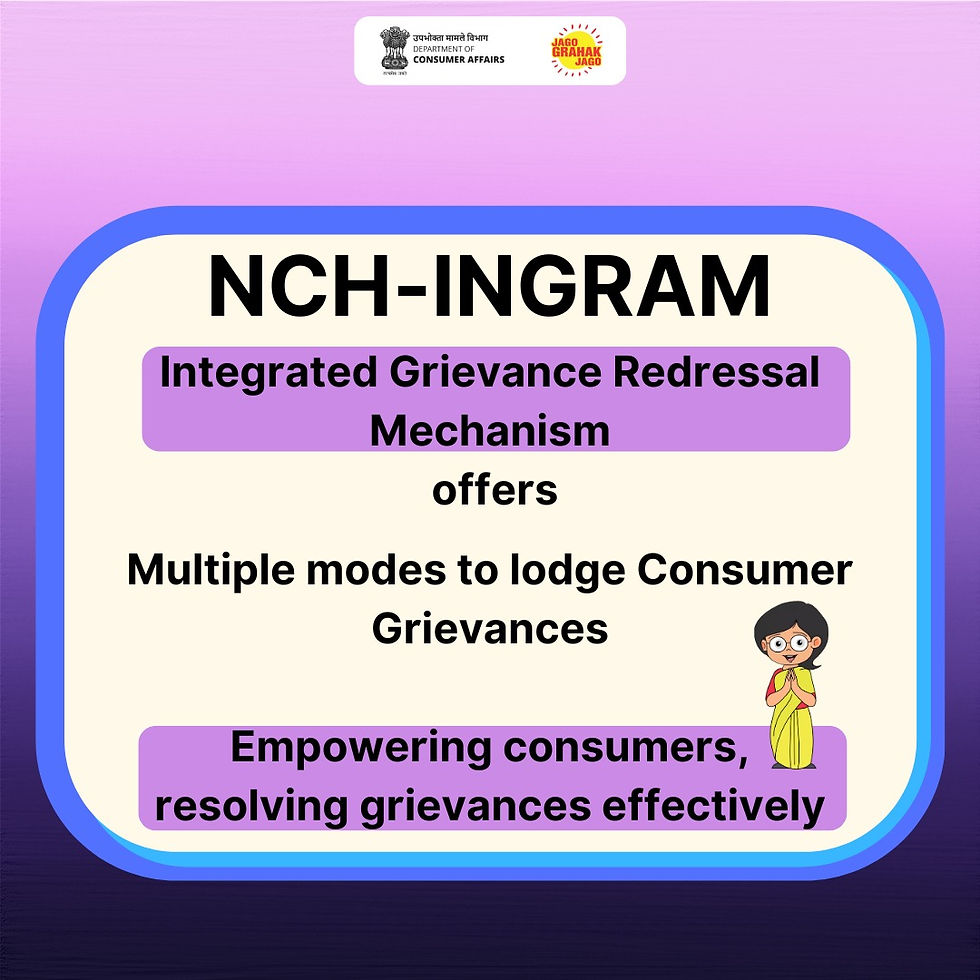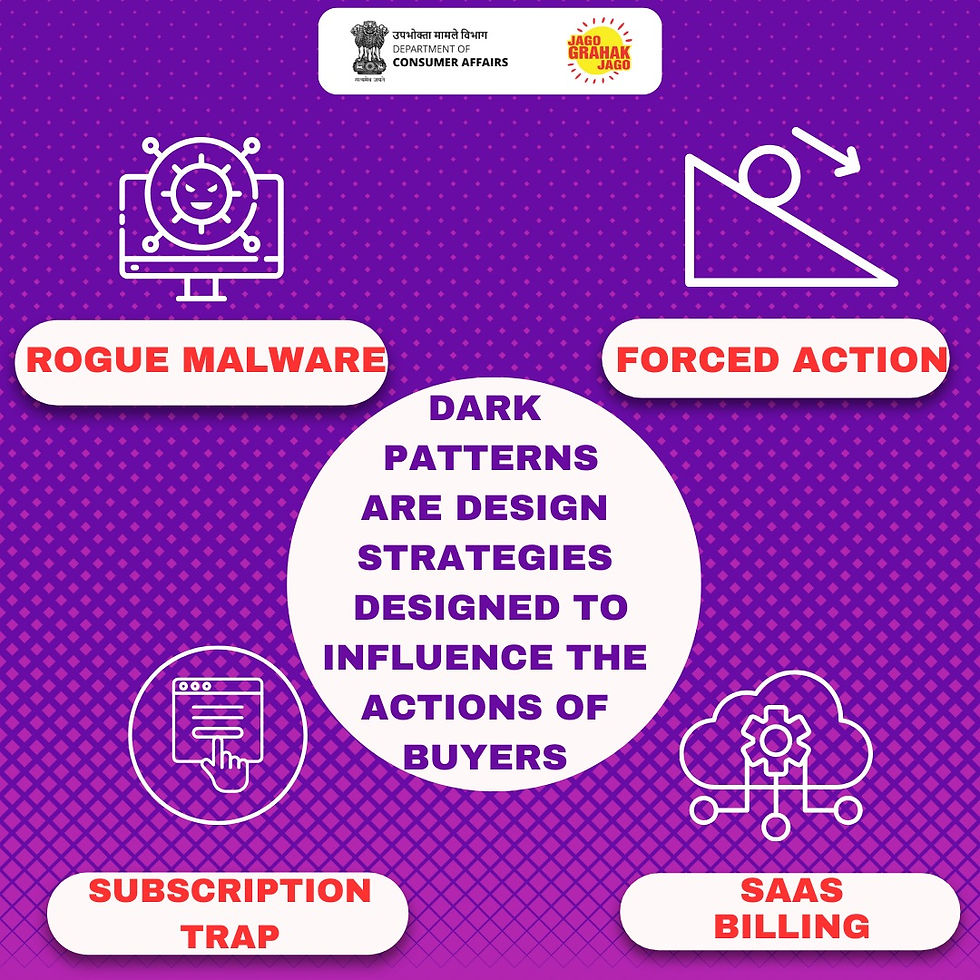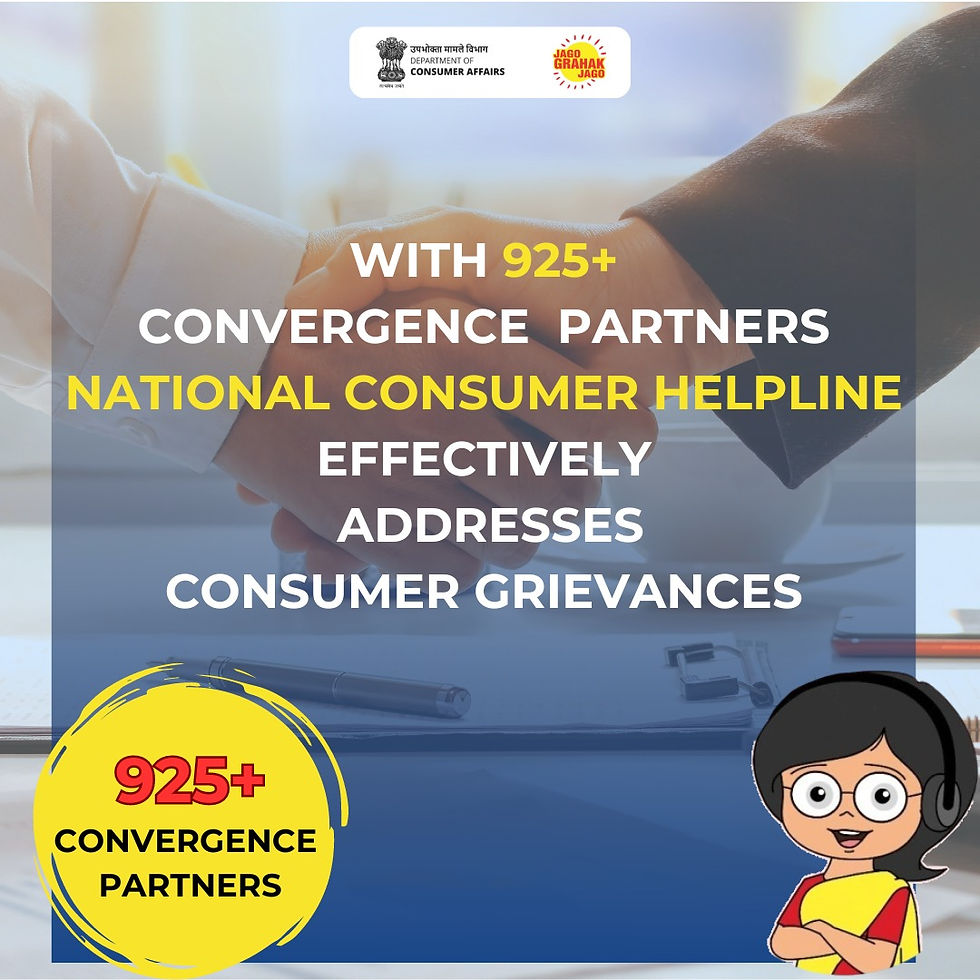The Department of Consumer Affairs has initiated the launch of this website to raise awareness, provide guidance, and address consumer complaints, serving as a centralized platform for lodging grievances.
While every effort will be made to resolve these complaints satisfactorily, it may not always be possible to do so.
This portal serves as an alternative dispute resolution mechanism, allowing dissatisfied consumers to seek recourse through the appropriate Consumer Commission/Fora if necessary.
Named the Integrated Grievance Redress Mechanism (INGRAM), this portal aims to unite stakeholders including consumers, government agencies, private companies, regulators, ombudsmen, and call centers on a single platform. It also aims to raise consumer awareness about their rights and responsibilities.

Consumers can submit their grievances online through this portal.
National Consumer Helpline: 1915 , 1800-11-4000
Financial Frauds : 1930
Who is a Consumer?
A Consumer is a person who purchases a product or avails a service for a consideration, either for his personal use or to earn his livelihood by means of self employment. The consideration may be:
Paid Promised
Partly paid and
partly promised .
It also includes a beneficiary of such goods/services when such use is made with the approval of such person.
Consumer Protection Act 2019
Section 53. Establishment of National Consumer Disputes Redressal Commission.—(1) The Central Government shall, by notification, establish a National Consumer Disputes Redressal Commission, to be
known as the National Commission.
(2) The National Commission shall ordinarily function at the National Capital Region and perform its functions at such other places as the Central Government may in consultation with the National Commission notify in the Official Gazette:
Provided that the Central Government may, by notification, establish regional Benches of the
National Commission, at such places, as it deems fit.
Section 89. Punishment for false or misleading advertisement.—Any manufacturer or service provider who causes a false or misleading advertisement to be made which is prejudicial to the interest of consumers shall be punished with imprisonment for a term which may extend to two years and with fine which may extend to ten lakh rupees; and for every subsequent offence, be punished with imprisonment
for a term which may extend to five years and with fine which may extend to fifty lakh rupees.
Latest Updates :
The CCPA has issued advisories to, inter-alia, e-commerce companies to desist from manufacturing, selling or listing of products or services which are dangerous to life of the consumers which included selling and listing of car seat belt alarm stopper clips, illegal sale and facilitation of wireless jammers and also advised all marketplace e-commerce platforms to display information provided by sellers as per the E-Commerce Rules, 2020.
CCPA has also issued two safety notices cautioning consumers against buying goods that do not hold valid ISI Mark and violate compulsory BIS standards, such as Helmets, Pressure Cookers and Cooking gas cylinders and other household goods including electric immersion water heaters, sewing machines, microwave ovens, domestic gas stoves with LPG etc.

The Consumer Protection Act 2019 explicitly includes e-commerce transactions within its scope, defining e-commerce as the buying or selling of goods or services including digital products over digital or electronic network.
To safeguard consumers from unfair trade practices in e-commerce, the Department of Consumer Affairs has already notified the Consumer Protection (E-commerce) Rules, 2020 under the provisions of the Consumer Protection Act. These rules, inter-alia, outline the responsibilities of e-commerce entities and specify the liabilities of marketplace and inventory e-commerce entities, including provisions for customer grievance redressal.
The Department has noticed emergence of unfair trade practices known as “dark patterns” which involve using design and choice architecture to deceive, coerce, or influence consumers into making choices that are not in their best interest.

The Department of Consumer Affairs (DoCA) conducted an interactive consultation in Mumbai on June 13, 2023 with various stakeholders including Advertising Standards Council of India (ASCI), e-commerce companies, industry associations etc.
The Department of Consumer Affairs has urged the e-commerce companies, industry associations to refrain from indulging in any design or pattern in the online interfaces of their platform that may deceive or manipulate consumer choices and fall into the category of dark patterns.
This information was given by the Union Minister of State for Consumer Affairs, Food & Public Distribution, Shri Ashwini Kumar Choubey in a written reply today in the Lok Sabha.

The Advertising Standards Council of India (ASCI) is a non-profit, self-regulatory organization in India that works to ensure fair and honest advertising practices. Here's what you need to know about ASCI:
What it is:
Established in 1985, ASCI is a voluntary body representing the advertising industry in India.
It aims to maintain and enhance public trust in advertising through self-regulation.
ASCI focuses on ensuring advertisements adhere to their Code for Self-Regulation, which requires them to be:
Legal, decent, honest, and truthful
Not misleading or harmful
Fair in competition
Socially responsible
What they do:
ASCI sets guidelines for ethical advertising across various mediums, including traditional media and digital platforms.
They address consumer complaints regarding misleading or unfair advertisements.
ASCI works to educate advertisers, influencers, and content creators about responsible advertising practices.
They provide resources and tools to help businesses comply with their code.
Source:
PIB, Consumer ACT
Thanks for Visiting!!

Comments